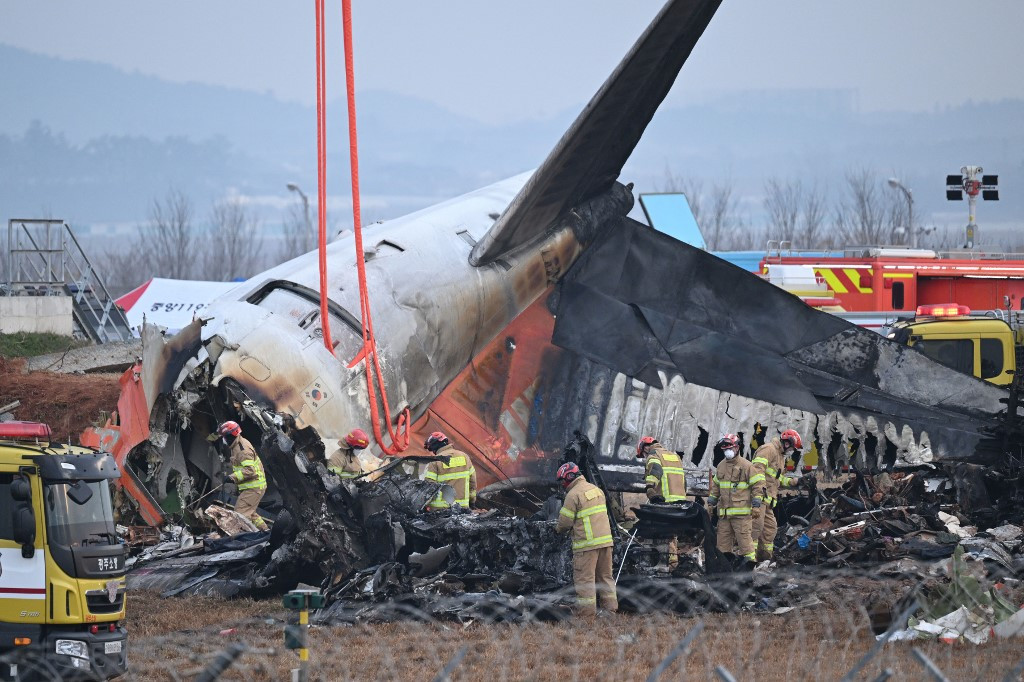Popular Reads
Top Results
Can't find what you're looking for?
View all search resultsPopular Reads
Top Results
Can't find what you're looking for?
View all search resultsHigh-flying reflections
Airlines must adopt a proactive approach centered on transparency, accountability and continuous improvement.
Change text size
Gift Premium Articles
to Anyone
T
here is no doubt that 2024 was one of the most harrowing years for aviation in recent memory. A string of tragic incidents in the final week of the year has left a deep scar on the global aviation industry and has shaken public confidence in air travel.
As we welcome the new year, it is imperative to address the lapses that made 2024 a challenging time for flying and work toward a future where such tragedies are minimized.
In the last week of December alone, four aviation accidents occurred during the peak travel season, underscoring systemic vulnerabilities.
Among these, the Jeju Air crash in South Korea on Dec. 29 was the most devastating. A Boeing 737-800, a model with a very recent history of scrutiny, attempted an emergency belly landing at Muan airport but struck a concrete barrier, killing all but two onboard.
This catastrophic event, South Korea’s worst aviation disaster, has reignited debates about airport infrastructure and the reliability of Boeing aircraft.
Similarly, incidents involving KLM in Norway and Air Canada in Halifax on Dec. 28, both linked to technical malfunctions, highlight the urgent need for advancements in aviation technology and maintenance protocols.
In stark contrast, the Azerbaijan Airlines crash on Christmas Day was attributed to geopolitical conflict. Flying 400 kilometers off course, the aircraft was reportedly struck by Russian defense systems amid the ongoing Ukraine-Russia war, killing 38 of the 67 people aboard.
This marked the second commercial flight lost to the conflict, following the downing of Malaysia Airlines Flight MH17 in 2014. Such incidents underline the need for global efforts to safeguard civilian airspace, particularly in times of war.
According to reports, 2024 saw at least 19 commercial aviation accidents globally, including a Singapore Airlines flight in May where severe turbulence caused the death of a passenger, the first such fatality since 1997.
Despite these troubling occurrences, it bears repeating that aviation remains statistically safe. A 2017 Harvard University study calculated that the odds of dying in a plane crash were one in 11 million. Needless to say, the emotional impact of each incident is magnified by the inherent trust passengers place in the aviation industry.
Indonesia’s aviation sector has not been immune to these challenges. In the past five years, the nation recorded at least 16 aviation accidents, including noncommercial flights, according to local reports.
Early in 2024, the revelation that two Batik Air pilots fell asleep mid-flight due to exhaustion shocked the public, exposing glaring weaknesses in the human component of flying.
The 2018 Lion Air flight 610 crash, one of Indonesia’s deadliest aviation disasters, also remains top of mind.
One of the defining stories around travel in recent years is how air travel has struggled post-COVID. The surge in demand has exposed cracks in staffing, air-traffic control systems and aircraft maintenance, compounded by climate and weather-related factors.
These challenges, combined with technological flaws and geopolitical tensions, have made even short-haul flights a nerve-wracking ordeal.
Yet there is hope. The aviation industry must prioritize passenger safety over profit. This involves rigorous oversight of aircraft manufacturers like Boeing, whose path to redemption depends on it.
Airlines must adopt a proactive approach centered on transparency, accountability and continuous improvement. Regulatory bodies, too, must enforce stringent safety measures, ensuring no lapses go unchecked.
As an archipelagic nation, Indonesia has no viable alternative to air travel. The government must simply invest in aviation safety while fostering public confidence.
Passengers, in turn, must remain vigilant, holding airlines and regulators accountable.
Let us use this moment of reflection to honor those who have perished and to learn from the past. Aviation safety is not merely about statistics; it is about the lives and trust of millions who take to the skies each day.
May 2025 be a year of renewed commitment to making air travel safer for all.











